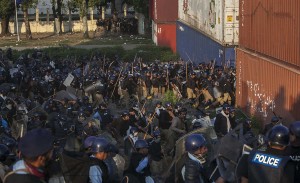ISLAMABAD, Aug 31:

Pakistani opposition leader Imran Khan called on more of his supporters to take to the streets today and stand up to security forces, after weeks of protests demanding Prime Minister Nawaz Sharif’s resignation turned violent.
Peaceful anti-government demonstrations spilled over into deadly confrontation overnight after thousands of protesters tried to storm Sharif’s residence. Police responded with teargas and rubber bullets. At least three people were killed and 200 wounded, hospital officials said. Activists demanding Sharif’s resignation have camped outside Government offices for more than two weeks but it was the first time violence broke out as protesters, some armed with sticks and wearing gas masks, tried to break through police lines.
Army chiefs held an emergency meeting in the garrison city of Rawalpindi tonight to discuss the crisis, prompting speculation that the military could take decisive action to end the crisis in a democracy where power has usually changed hands via coups rather than elections. Small skirmishes continued into today, with police occasionally firing teargas. The atmosphere remained tense, with thousands of people still massing outside parliament. Smaller protests were also reported in the city of Lahore, Sharif’s power base.
Khan, a renowned cricketer before entering politics, called on more protesters to join him and to prepare for a second night of trouble.
“I am prepared to die here. I have learnt that Government plans a major crackdown against us tonight,” he said. “I am here till my last breath.”
Khan told the cheering crowd to challenge security forces protecting the parliament and the Prime Minister’s House. “The way you stood up last night, you have to stand up today also,” he said. “We will face them and make them run away this time.”
ARMY’S ROLE
How the crisis ends ultimately lies in the military’s hands in a country ruled by generals for half of its entire history.
Sharif, who swept to office last year in Pakistan’s first democratic transition of power, has resisted calls to resign while agreeing to meet other demands such as an investigation into suspicions of fraud during last year’s election.
His office reiterated today evening that his resignation was out of the question and called on all sides to find a negotiated and peaceful solution to the standoff. “It was agreed that this undemocratic onslaught should be withdrawn and parties should come back to the negotiation table,” his press office said in a statement after Sharif chaired a meeting with his top officials. Ousted from an earlier stint in office in a coup in 1999, Sharif still has a difficult relationship with the army. Even if he survives this crisis, he will remain significantly weakened and sidelined on key issues such as foreign policy and security.
Another opposition leader, cleric Tahir ul-Quadri, who has rallied thousands of his own supporters alongside those of Imran Khan, said protests would not subside unless Sharif resigned.
“State atrocities have reached their peak,” he told his supporters, standing on top of a shipping container. “Imran khan and Dr Quadri are fighting this war together.”
Meanwhile, embattled Nawaz Sharif today vowed to protect State institutions as he appealed to the protesters to restart negotiations with the Government to end the 18-day political impasse.
Sharif, who chaired a high-level meeting at the Prime Minister’s House this afternoon, also endorsed an Opposition proposal and convened a joint session of Parliament on Tuesday.
The meeting was attended by federal Ministers Ishaq Dar, Chaudhry Nisar Ali Khan, Ahsan Iqbal, Senator Pervaiz Rashid, Zahid Hamid, Abdul Quadir Baloch and Khawaja Saad Rafiq.
According to an official statement, the meeting condemned the attack on key buildings considered as symbols of the state by protesters led by Imran Khan and Tahir-ul-Quadri and termed it “undemocratic and unconstitutional”.
The steps taken by police and security forces to defend and defeat violence were appreciated.
It said that the Government adopted the path of negotiations but was betrayed and that the protesters invaded the premier’s house despite prior commitment not to do so.
The participants of the meeting also agreed that the undemocratic onslaught should stop and parties should come back to the negotiation table.
“The Ministry of Interior was directed to utilise all resources to ensure protection of state institutions without loss of life,” it said on last night’s violence as the protesters tried to enter the premier’s house.
Sharif also decided to endorse a proposal of leader of the Opposition Syed Khurshid Shah and convened a joint session of Parliament on Tuesday.
The meeting condemned acts of violence against the media, which resulted in injuries and damage to their equipment.
The Prime Minister directed officials to start immediate investigation of these incidents and promptly ensure verified compensation mechanism.
Khan and Quadri have been agitating since August 14 outside Parliament with thousands of supporters, demanding Sharif’s ouster.
Khan alleges that last year’s general election which brought Sharif to power was rigged. (AGENCIES)

